#Rappi app clone development
Explore tagged Tumblr posts
Text
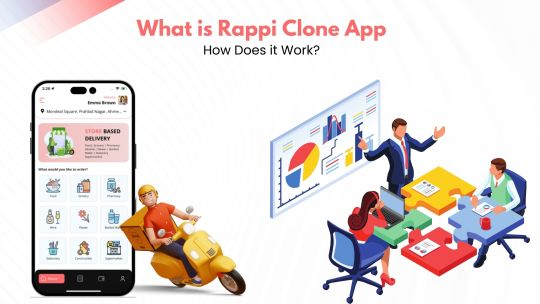
Starting a delivery business from the app development end has never been this easy with the help of a White Label Rappi Clone. Read this blog to learn how it works.
1 note
·
View note
Text
A Guide to Building Multi-Service Platforms Like Rappi
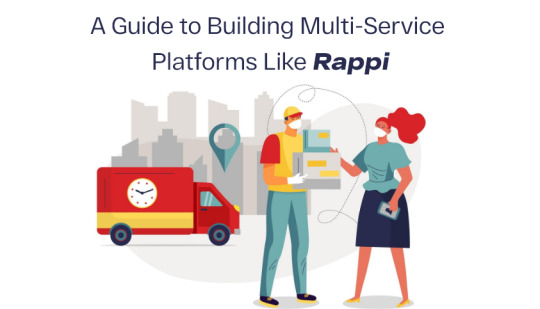
Life has become incredibly convenient nowadays. You can get almost anything you want delivered right to your doorstep with just a few taps on your phone. Quick satisfaction has become the norm in this fast-paced world.
But our busy schedules often make it hard to enjoy simple pleasures like going out for a nice meal or shopping in a physical store.
The idea of getting whatever you want, whenever you want it, is a big part of our lives now. Whether it's because of changes in our culture or how younger generations view things, on-demand services are here to stay.
One of the best on-demand delivery services out there is called Rappi. It's a big deal, with a market worth more than 300 million dollars. Given its success, many companies that develop apps are interested in creating a Rappi clone.
If you're one of those companies looking to make a clone app, this blog is for you. It will guide you through the process of creating a Rappi-like app.
What is Rappi?
Rappi is like a super app that lets you order all kinds of things you need, like food, medicine, or everyday stuff. Imagine you have lots of apps on your phone for different things, like ordering food or getting groceries. The Rappi clone app is like a superhero app that combines all those things into one.
With this app, you can ask for what you want, like a pizza or some shampoo. The app then tells the delivery person to bring it to you, and you can pay for it in different ways. So, Rappi is like a bridge that connects people who want things with the people who can deliver them.
The Rappi clone app is successful because it offers great customer support and everything you could ever need in one place. If a business wants to make their customers really happy with a fancy app for ordering stuff, they can talk to the top companies that make these kinds of apps.
How to Create A Rappi Clone App?
Here are four essential steps for creating a Rappi Clone App. Many businesses struggle to make on-demand apps because they don't know these strategies. By following these steps, you can develop a robust, innovative, and fast app to compete effectively. Let's dive into these strategies.
Planning and Development:
Creating a successful app requires a solid business plan. You need to think about how your app will make money.
Here are some things to consider when creating a business plan for your Rappi Clone:
Services Offered: Think about what kinds of services you want to offer. Make a list of all the things your app will do.
User-Friendly Design: People like apps that are easy to use. So, make sure your app is simple and works well.
Partnerships: If your app will be used for ordering food, medicine, or groceries, you should talk to local restaurants, pharmacies, and grocery stores.
Professional Help: Hiring experts in mobile app development can be a big help. They can help you come up with a good business plan and figure out how your app will make money.
Choosing the Right Tech Tools:
When you're making an on-demand delivery app like Rappi, you need to pick the right tech tools to make it work well. Your choices here can affect how much it costs to build your Rappi clone.
Here are some tech tools you might need:
Frameworks: These are like the building blocks of your app. You can use Flutter, React Native, or Ruby on Rails to create your app.
Payment Systems: These tools help people pay for things in your app. You can use PayPal, Square, or Google Wallet.
Programming Languages: These are like the languages your app speaks. You can use Java, Swift, or PHP.
Email Marketing: If you want to send emails to your app users, you can use MailChimp, Mailgun, or Zoho.
Push Notifications: These are messages that pop up on your phone. You can use tools like Twilio, MAP, or Flink to send them.
Other Tools: Depending on what your app does, you might need extra tools. For example, Google Fit SDK and Google Tag Manager can be helpful.
Remember, if you're making an app for iPhones (iOS), you'll need iOS developers. Keep in mind that using these tools might cost you some money.
In-Depth Market Analysis:
Before you start making a Rappi clone app, it's crucial to understand the market really well. This means looking at different aspects of how the app will work and what challenges you might face.
Here are some things to consider for your Rappi clone app development:
Easy Promotion: You should be able to tell people about your app on social media. Since it's an on-demand delivery app, you need to make it easy for users to find and use it.
Innovation: Think about adding cool features like live location. This makes your app more interesting and useful.
Understanding User Problems: Market analysis helps you find out what issues users might face with your Rappi clone app.
Competition: There might be other apps like yours. You should know who your competitors are and what they're doing.
Building a User Base: Getting people to use your app regularly can be challenging. You need a plan to make them stick around.
More Research and Help:
Now it's time to decide what things you want to offer and make them easy for people to get. Even though people might be unsure about using your service at first, don't worry. Rappi clone apps already have users who like this kind of service.
You can also provide information like frequently asked questions to help people understand your business better. While it might be tough to compete with other on-demand delivery apps, if you use top-notch website development services, you can add special features to make your app stand out from the competition.
Expected Features
When you start in a big market with other apps, what sets you apart are the special things your app can do.
To do well, your Rappi clone app should have some extra features:
Delivery Management
Free Delivery
GPS Tracking
One-Day Delivery
Optimization
Data Analytics
Personal User Profiles
Cashback and Discounts
Factors that Make Your Rappi Clone a Hit!
If you're wondering why making a Rappi clone is a good idea, it's because of the things that make Rappi successful!
Here are a few reasons why Rappi is great:
Mobile: You don't need a computer; you can use your handy smartphone.
Speedy: They deliver super quickly. Your order can be at your doorstep within 30 minutes!
Affordable: These apps give you discounts and perks, which means it's a money-saver.
Easy Payments: You can pay easily through things like online banking or cash on delivery.
Independent Workers: The whole app works by having lots of independent workers who provide their services.
Wrapping Up!
We live in a world where we can find answers to almost anything in an instant, just like we want quick and efficient products and services. Rappi App is a blessing in this regard because it offers a single solution for all your delivery needs.
Creating a Rappi clone app is a smart move, considering it's one of the fastest-growing markets for delivery apps. If you have a business idea, now is the perfect time to take action and dive into the world of Rappi clone development.
0 notes
Text
Enhance Your On-demand Business Vertically By Launching The Rappi Clone App

No matter the number of on-demand apps being rolled out, the demand among users is still steep. We all know the major cause for the non-stoppable growth of the on-demand sector, which is the user’s convenience. So, as far as these on-demand apps are concerned they are saviors to users. Alright! You must be keen to step into this highly lucrative business and so is this blog curated. Start reading to know more!
Multi-services business is the kingdom of the on-demand sector
You know how far the preference among users for on-demand services has penetrated. If you have plans to hold on to only one on-demand service, then you must reconsider that decision. The multi-services businesses are making a storm in the business world and you can’t seek any better time than now to start a multi-service business.
The commonly provided on-demand services in any multi-services apps are taxi booking, food delivery, handyman services, and grocery delivery. There are other services like babysitting, pet care services, laundry services, pharmacy delivery, alcohol delivery, etc. The preferences of users on these services are purely based on their demographics. So, demographic analysis is the key consideration for any business.
Rappi clone app for your multi-services business
Rappi clone is an instant multi-services app development solution. You can adjust the app’s UI/feature using the customization facility provided by your app developer. Generally, the Rappi clone app covers
A useful app for Android/iOS
A delivery person app for Android/iOS
A store app for Android/iOS
An admin panel
The main website
An excerpt on the Rappi clone app development process
Understanding the intricacies of your requirements will fall as the first step. Once developers discuss the requirements with you, they will document the same.
You will get the demo version of the app and you can share your views so that developers can make the necessary changes or customizations.
Once the customization stage is completed, the app will be tested and submitted for launch.
#Rappi clone#Rappi clone app#Rappi clone script#Rappi clone app development#Rappi like app#Rappi like app development#Rappi clone app development company#Rappi like app development company#Rappi app clone#Rappi app clone development#Delivery app solution#All in one delivery solution#Brazil delivery app solution#Delivery app for Brazil
0 notes
Photo

Our rappi clone is dynamically adaptable and so can be modified readily to suit many on demand delivery business concepts and ideas. So, it is of no surprise that our rappi clone will be the best choice to develop an impressive on demand delivery platform within the budget and in a short span of time
0 notes
Photo
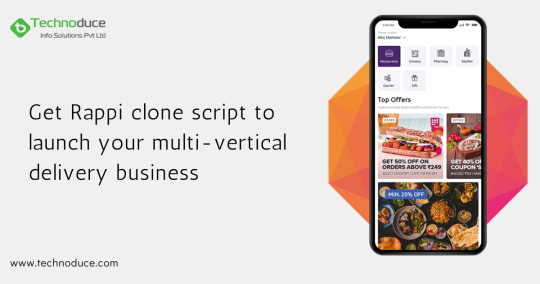
An individual who wishes to #launch an on-demand #multi-service business must be considered creating a Rappi-like app in order to succeed. #Rappi is a tremendous hit with all the entrepreneurs that run various firms. We provide a variety of specialized #features to set the app apart from the competition. Get your rappi clone to commence an online #marketplace business now.
#technoduce#rappi#rappi clone#rappi clone app#rappi clone script#rappi like app development#rappi like app#gojek clone#gojek clone app#gojek clone script
0 notes
Text
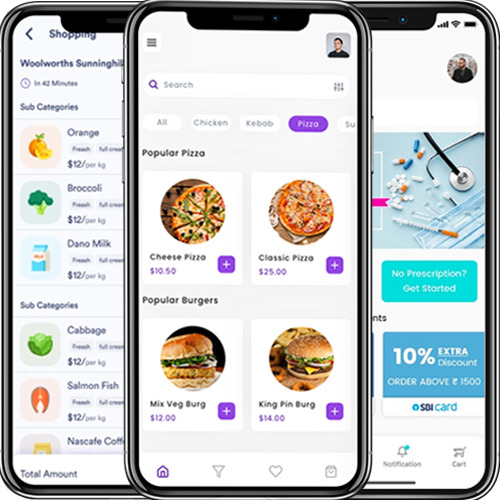
#Rappi clone#Rappi clone app#Rappi clone script#Rappi like app#Rappi like app development#app like Rappi#On-demand delivery app Like Rappi#Rappi clone app development#Delivery app solution
0 notes
Text
An Entrepreneur’s Guide For Building A Rappi Clone

Just a few months back, the popular Rappi app got funding over $300 million. Undoubtedly, it is one of most successful on-demand delivery platforms. And its year-by-year growth is inspiring more entrepreneurs to invest in a Rappi clone.
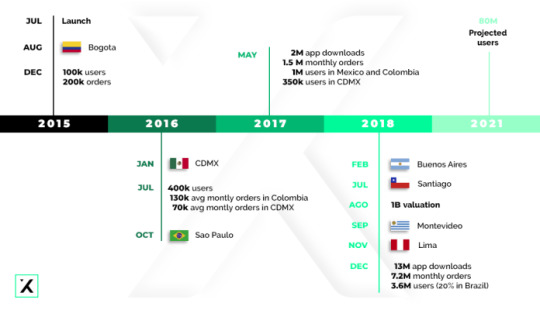
Do you have some similar plan? Want to create your own Rappi clone? Investing in a $70,741 Million industry is great decision. Building your branded super-app allows you to run multiple businesses under one solution. So, here’s all you need to know before you kick-start you last minute delivery app like Rappi.
Rappi- Colombian Startup Unicorn
Being a popular on-demand delivery app platform based in Colombia, Rappi delivers almost everything. Right from medicines, groceries, electronics to your favorite food, customers can get all delivered at their doorstep. Now they are also into renting bikes and providing basic banking services like paying bills or sending cash.
Suggested Read: What Makes Delivery App Like Rappi Successful In Latin America?
Here’s A Step-by-Step Guide To Build Your Rappi Clone
Step1: Understanding Business Model & Revenue Model
To launch your Rappi Clone, it is highly essential to have a clear understating of its business model. Also, it is equally important to find out how Rappi makes money. To help you with this here’s a complete video:
youtube
Step 2: Analyze The Market- SWOT Analysis
Make sure you analyze the market and the competitors of your local/national demographic. While developing a Rappi clone, it is important to pay attention to the user experience and interface. For this, you need a complete SWOT (Strength, Weakness, Opportunities, and Threats) analysis.
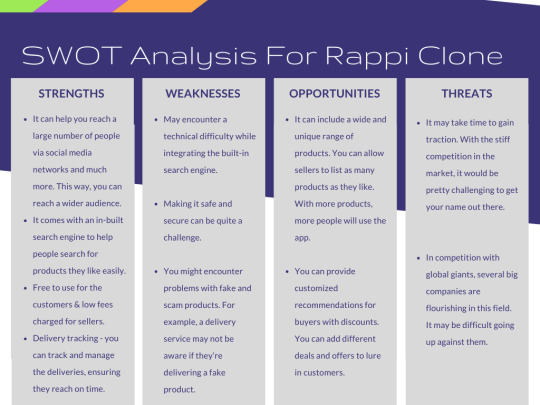
Step3: Define Your Products
Letting the customer know what you are all about is quite important. Without a clear idea of what your app does, people may be hesitant about using it. Since you’re trying to develop an on-demand delivery app like Rappi, you need to make that known to your customer.
You can do that by making a list of FAQs for your customers to read:
What service or product does your company offer?
Who is the target demographic for your product/service?
What’s the main benefit of using the product/service?
How is it different from other similar products?
It’s difficult to distinguish yourself in the on-demand delivery industry landscape. But incorporating small value-added components and features can help your app stand out.
Step 4: Make A Checklist Of Features
By now you have gained enough knowledge about the super app. Iit’s high time to explore the list of features you need to have in your Rappi Clone. So, here is a small checklist of features you need to have in an on-demand delivery app to simplify things for you.
Fleet management system
GPS tracking for tracking deliveries
Data tracking
Warehouse/Inventory management features
Smart tracking features
Route optimization
Data analytics
Integrations of plugins
Customer reviews
Personalization options
One day delivery option
Cash-back guarantee
Free delivery above a specific price
These are some of the basic features you need to build an app like Rappi. Want to explore full feature list for your multi-service app? Download your feature-book here.
How Much It Cost To Build A Rappi Clone?
Developing a Rappi clone doesn’t involve a specific cost. It depends on various factors like features, operating system, integrations, and more. Typically, all these things are chargeable on per hour rate, and the pricing can range anywhere from $20 to $100/150.
As an estimate, from backend development to the final testing, the whole process requires about 2,800 hours. However, if you want to launch an MVP (Minimum Viable Product), it could cost you about $10,000. MVP is basically a product with just the basic features.
But, if you want the basics with customization included, it could cost you somewhere around $15,000 to $20,000. And for an app with every feature, it could end up costing you $50,000 to 100,000.
What Pricing To Choose For Launching Your Rappi Clone?
Each pricing model comes with its own pros and cons. The white-label solutions are inexpensive and help you get onboard in no time. However, these aren’t sufficient to help you make a difference in the market. Limited themes, features and integrations serve to be major drawback.
On the other hand, a purely customized Rappi clone can be very costly. Plus, this might take up to several months to make you go live.
Is there a mid-way?
Fortunately, there is a solution that intersects between the SaaS-based solutions and customizations. Being a premium app development company, Code Brew has the core engine ready for you. Simply putting, we already have 80% of what you need. And rest, the customizations can be done as per your specific requirements.
Sounds great? Let’s connect to transform your idea into reality now!
Originally published at https://www.code-brew.com.
#on-demand delivery#Rappi clone#delivery app like Rappi#on-demand delivery app#app development company
0 notes
Text
Launch the Rappi clone app and relish the benefits

The prerequisite for any business is a well-structured plan and funding. When it comes to the business plan you can consider the ones that are currently flourishing in the marketplace. Undoubtedly, the on-demand delivery apps are the ones that are currently the top-ranking apps. With the on-demand delivery apps, you can capitalize your business and income as well. Here, you will learn about the non-pareil on-demand services app called the Rappi clone script. The blog will revolve around the sources of income for your business from the app.
Sources of income from adopting the Rappi like app development
Commission fees- One of the predominant sources of income is via commission fees. As the user places the service request via your app, you will gain commission fees from the corresponding service provider. For example, the user places food orders via the app. Then the corresponding restaurant will pay you commission fees.
Delivery charges- For every delivery, you can fix a certain amount as delivery charge according to the distance of the user’s location. For example, the location of the user is within 10km, then you fix a certain amount and for locations more than 10km, you can cost accordingly.
Advertisements- By collaborating with advertising partners, you can foresee maximum revenue from displaying advertisements on your app. The partners will pay for every ad displayed on the app either on a pay-per-click or pay-per-impressions basis.
Conclusion
The on-demand services have become the new normal for users as they can get their needs satisfied then and there. This shows that investing in the Rappi clone app will be profitable for you.
0 notes
Text
A Complete Guide to Develop A Rappi Clone App
On-demand delivery app development is gaining immense popularity these days, and as a result, delivery apps like Rappi, Uber, and Airbnb are in high demand. The increased popularity of such applications has pushed most businesses to think about developing a Rappi clone app. Rappi offers one of the best on-demand delivery app solutions and holds a market value of around 300 million US dollars. Although popular on-demand delivery solutions like Uber and Amazon top the list, apps like Rappi are inspiring entrepreneurs to bring new and unique on-demand delivery solutions to the market. In all of this, on-demand app development companies are assisting businesses to create a Rappi clone app and earn more profit and success. So, if you are the one planning to build an on-demand delivery app like Rappi clone, this blog is for you. It acts as a complete guide to developing a successful on-demand delivery app.
0 notes
Text
Excel in the on-demand sector with an innovative Rappi clone app
At present, there are no services that cannot be availed via online apps. There is an app for every service that people require. People have also become comfortable with the doorstep deliveries or services offered to them. So, it is evident that a brand with the right app and good-quality service can become a crucial player in the delivery market. Your business brand can also thrive in the on-demand sector if the app is developed and launched by the masterminds in the industry. You can adopt a Rappi clone app solution that is available at nominal prices and set foot in the sector in no time. This blog will guide you through various revenue models that you can integrate into your delivery app. Discuss these sources with your developers and make sure they toil hard to deliver an efficient and income-yielding platform.
Delivery-based commissions:
Multiple deliveries will take place via your all-in-one delivery solution. As the admin, you can cut-down a fixed percentage of commission for each delivery that takes place through your app. This will be your constant stream of revenue. During registration, admins can fix a commission percentage with the store owners or vendors. Once they agree to the commission rate, they can proceed to upload the products to the app.
Featured listing:
Store owners or vendors who wish to get listed among the top sellers can pay a featured or priority fee to the admin. On successful payment, the store will be available in the featured list and will appear at the top when users search for a product.
Advertising:
This is a revenue source where you can generate a lump sum amount consistently. You have to team up with other brand owners in the market and allow them to display their ads on your app. They will pay a fixed fee for hosting the ad, and it will be valid for a particular time period. If they wish to continue hosting the ad, they need to pay again.
Subscription model;
Multiple premium subscriptions can be offered to users for a fixed amount of money. The subscription will be valid for a fixed time period, after which they have to renew the subscription by paying again.
Conclusion:
Revenue is the key source that will help you develop your business in the long run. So, make sure you include these crucial revenue streams in your app. Approach the best firm in town to launch your successful Rappi clone app. Initiate the development process now
0 notes
Text
Are APIs the Gateway to Latin America?
The Application Programming Interfaces wave is moving beyond Silicon Valley.
March 19, 2020 6 min read
Opinions expressed by Entrepreneur contributors are their own.
I recently read an article by Daniel Levine, a Partner at Accel, about how the Application Programming Interfaces (API) wave is sweeping Silicon Valley. I would argue that Latin America is next. APIs are the building blocks that make it possible for both consumer and B2B startups to function. These APIs are increasingly essential to the infrastructure layer that supports technology businesses, especially in fintech and insurance tech.
In the U.S., startups like Checkr, Plaid and Stripe have become invaluable not only to technology startups, but also to traditional businesses that now realize the advantage of being able to automatically integrate background checks, financial tools or payments systems without having to develop proprietary software. This year, Stripe became one of the world’s most valuable API-focused startups, worth $35 billion and backed by giants such as Andreesen Horowitz and Sequoia.
Today, Latin America has room — and a pressing need — for APIs that can meet these needs locally. While in the U.S., there are software-as-a-service (SaaS) and API-based products available to fulfill the back-end needs of larger companies and startups, many companies in Latin America are still stuck in line literally to get contracts signed in front of notaries, or to deposit money in physical banks. In Latin America, there can be hundreds of disparate data sources, many with unstructured data, that make creating these companies even harder than in the US. But those that win will likely have outsized impact on the region.
Related: The API Economy: What’s in It for Business?
In the U.S. or Asia, the “winners” in each API-based service category dominate their market with little to no competition once larger businesses begin to trust and depend on them. The same will happen in Latin America, with local clones of the companies Levine mentioned, including Checkr, Plaid and Stripe.
International investors are starting to pay attention to startups in Latin America that are becoming the indispensable building blocks for the next generation of businesses. And over the next few years, the battle to provide back-end, API-based services for Latin America’s startups and traditional businesses will become increasingly valuable, particularly in the following areas.
Authentication and Identity Verification
Authentication-as-a-service startup Auth0 is one example. Auth0 provides a universal online identification and authentication platform for web and mobile applications, and became Argentina’s fifth unicorn last May. Built for developers, this platform helps companies save time and money by rapidly implementing dozens of authentication services, including single-sign-on, fraud detection and universal login structures. After receiving investment from Bessemer Venture Partners and Sapphire Ventures, among several others, the company is now worth more than $1 billion and has offices in 30 countries serving more than 5,000 corporate clients.
While Auth0 solves identity authentication online, Colombia’s Truora does the same offline with automated background checks. Companies that want to conduct a background check on their employees in Latin America practically have to hire a private investigator or wade through numerous public and private data sources. In most areas, the process requires slow and costly paperwork, which is simply unscalable for a startup with 5,000 contract workers. Truora uses a smartphone to scan an ID card and provide results within minutes, creating a database that marketplaces like Uber, Rappi and more can use to vet contractors and that fintechs can use as part of their loan approval process.
Accel and Kaszek invested in Truora’s Seed round after they finished Y Combinator in Winter 2019 to help the company become Latin America’s answer to Checkr. In the U.S., Checkr provides automatic background-checking services to companies with giant employee bases, such as Uber and Instacart. As the gig economy rises in Latin America, these services can help ensure that on-demand startups hire quality workers.
Processing Online Payments
Many Latin American countries have local Stripe clones, but most of these companies still focus on only one country and have not yet united the entire region under a single platform. The startup that succeeds in doing so will likely win the race to become known as the “Stripe of Latin America,” but that race will be a tough one.
Latin America is consistently one of the fastest-growing regions for e-commerce, and at least prior to the current COVID-19 crisis, economists estimated that in excess of 155 million people would shop online in Latin America in 2020. Yet many traditional payments gateways still reject international cards, use clunky authentication processes and struggle to process recurring payments. As a result, new startups are competing to streamline online payments for businesses across Latin America, but no one is dominating the region just yet.
Improving Access to Financial Data
One of the other essential API building blocks for the entrepreneurial ecosystem will be a Latin American version of Plaid or Yodlee, a service that allows consumers to connect their bank accounts to apps. So far, there are a few small players in the Latin American market, and international investors are interested in supporting Latin America’s version. In a region where less than 50 percent of people have bank accounts, a Plaid clone will be essential to build the backbone of the many fintech startups that are serving Latin America’s unbanked middle class.
Bringing Business Operations Online
Many corporations in Latin America still manage their processes on paper, requiring expensive and slow notaries, lawyers and accountants. Meanwhile, growth for new startups is often slowed by these expenses and barriers.
Startups will be the early adopters of APIs that can solve their internal administration issues with a single click. For example, services that use digital signatures to replace a notary can save companies time and money on essential processes so they can focus on more important matters.
In the long term, Latin America’s leading corporations will adopt these services as well. The process will be slow, as many of these companies still manage more than 90 percent of their administration on paper, but the advantages of these rapid and inexpensive services will eventually outweigh the transition costs. What’s more, as the younger generation takes over their family businesses in retail, telecommunications and energy, these companies will begin to look to digital options to simplify and streamline their operations and compete with more agile startups.
Related: How This Startup Is Building API for Millions of Developers
There is reason to believe that API-first startups could become the backbone of Latin America’s innovation ecosystem as they have in the U.S. In the aforemnentioned article, Daniel Levine makes it clear that Silicon Valley’s most prominent VCs are looking at this space at home and abroad. It is only a matter of time before international investors start to develop Latin America’s API infrastructure layer, with the potential for building billion-dollar companies that support businesses of all sizes across the region.
Website Design & SEO Delray Beach by DBL07.co
Delray Beach SEO
source http://www.scpie.org/are-apis-the-gateway-to-latin-america/ source https://scpie.tumblr.com/post/613040028430565376
0 notes
Text
Magnify The Growth Of Your On-demand Services Business With The Rappi Clone
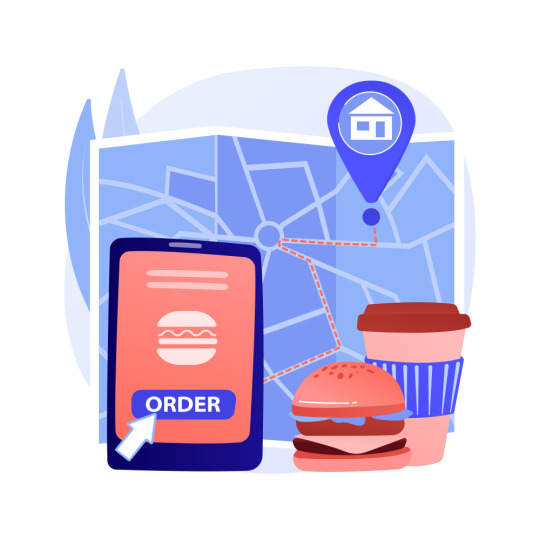
Hi! Are you ready to know about the multi-services app development? This blog ensures that you will get a thorough understanding of multi-services app development with the Rappi clone app solution.
Notably, the growth of on-demand apps has multiplied over the years and as of the current times, they remain to be people’s favorite. Alright! Now, it is your turn to become the owner of the on-demand multi-services business. Here, you will get all the information regarding the Rappi clone app development and the perks we offer for our app solutions.
What is the Rappi clone app?
A similar app solution of Rappi is called Rappi clone. The similarity between the original and clone applies in the features and the workflow. The Rappi clone is stable and can connect millions of incoming order requests with the server. The app has every feature that any multi-service app has. The features are a location tracker, integrated payment system, in-app chat, order history, etc. Let us swiftly examine how we develop all our app solutions.
Understanding the core requirements of your project is what we do at the first stage.
Next, our team will discuss with you the estimated budget and also listen to your app customization requirements.
Further, we will start customizing the ready-made Rappi clone app. The UI customization will be done as part of the front-end development. Likewise, the feature/functionality customization will be done as part of the back-end development.
Finally, we will test every module for validating the requirements and white-label the app.
Benefits
Including the customization, the total time taken to complete the app will be around a week. That’s all. Further, the app is scalable so you can expand the functionality in the future. Overall, this app solution is packed with many benefits for your business.
#Rappi clone#Rappi clone app#Rappi clone script#Rappi clone app development#Rappi like app#Rappi like app development#Rappi clone app development company#Rappi like app development company#Rappi app clone#Rappi app clone development#Delivery app solution#All in one delivery solution#Brazil delivery app solution#Delivery app for Brazil
0 notes
Text
Are APIs the Gateway to Latin America?
The Application Programming Interfaces wave is moving beyond Silicon Valley.
March 19, 2020 6 min read
Opinions expressed by Entrepreneur contributors are their own.
I recently read an article by Daniel Levine, a Partner at Accel, about how the Application Programming Interfaces (API) wave is sweeping Silicon Valley. I would argue that Latin America is next. APIs are the building blocks that make it possible for both consumer and B2B startups to function. These APIs are increasingly essential to the infrastructure layer that supports technology businesses, especially in fintech and insurance tech.
In the U.S., startups like Checkr, Plaid and Stripe have become invaluable not only to technology startups, but also to traditional businesses that now realize the advantage of being able to automatically integrate background checks, financial tools or payments systems without having to develop proprietary software. This year, Stripe became one of the world’s most valuable API-focused startups, worth $35 billion and backed by giants such as Andreesen Horowitz and Sequoia.
Today, Latin America has room — and a pressing need — for APIs that can meet these needs locally. While in the U.S., there are software-as-a-service (SaaS) and API-based products available to fulfill the back-end needs of larger companies and startups, many companies in Latin America are still stuck in line literally to get contracts signed in front of notaries, or to deposit money in physical banks. In Latin America, there can be hundreds of disparate data sources, many with unstructured data, that make creating these companies even harder than in the US. But those that win will likely have outsized impact on the region.
Related: The API Economy: What’s in It for Business?
In the U.S. or Asia, the “winners” in each API-based service category dominate their market with little to no competition once larger businesses begin to trust and depend on them. The same will happen in Latin America, with local clones of the companies Levine mentioned, including Checkr, Plaid and Stripe.
International investors are starting to pay attention to startups in Latin America that are becoming the indispensable building blocks for the next generation of businesses. And over the next few years, the battle to provide back-end, API-based services for Latin America’s startups and traditional businesses will become increasingly valuable, particularly in the following areas.
Authentication and Identity Verification
Authentication-as-a-service startup Auth0 is one example. Auth0 provides a universal online identification and authentication platform for web and mobile applications, and became Argentina’s fifth unicorn last May. Built for developers, this platform helps companies save time and money by rapidly implementing dozens of authentication services, including single-sign-on, fraud detection and universal login structures. After receiving investment from Bessemer Venture Partners and Sapphire Ventures, among several others, the company is now worth more than $1 billion and has offices in 30 countries serving more than 5,000 corporate clients.
While Auth0 solves identity authentication online, Colombia’s Truora does the same offline with automated background checks. Companies that want to conduct a background check on their employees in Latin America practically have to hire a private investigator or wade through numerous public and private data sources. In most areas, the process requires slow and costly paperwork, which is simply unscalable for a startup with 5,000 contract workers. Truora uses a smartphone to scan an ID card and provide results within minutes, creating a database that marketplaces like Uber, Rappi and more can use to vet contractors and that fintechs can use as part of their loan approval process.
Accel and Kaszek invested in Truora’s Seed round after they finished Y Combinator in Winter 2019 to help the company become Latin America’s answer to Checkr. In the U.S., Checkr provides automatic background-checking services to companies with giant employee bases, such as Uber and Instacart. As the gig economy rises in Latin America, these services can help ensure that on-demand startups hire quality workers.
Processing Online Payments
Many Latin American countries have local Stripe clones, but most of these companies still focus on only one country and have not yet united the entire region under a single platform. The startup that succeeds in doing so will likely win the race to become known as the “Stripe of Latin America,” but that race will be a tough one.
Latin America is consistently one of the fastest-growing regions for e-commerce, and at least prior to the current COVID-19 crisis, economists estimated that in excess of 155 million people would shop online in Latin America in 2020. Yet many traditional payments gateways still reject international cards, use clunky authentication processes and struggle to process recurring payments. As a result, new startups are competing to streamline online payments for businesses across Latin America, but no one is dominating the region just yet.
Improving Access to Financial Data
One of the other essential API building blocks for the entrepreneurial ecosystem will be a Latin American version of Plaid or Yodlee, a service that allows consumers to connect their bank accounts to apps. So far, there are a few small players in the Latin American market, and international investors are interested in supporting Latin America’s version. In a region where less than 50 percent of people have bank accounts, a Plaid clone will be essential to build the backbone of the many fintech startups that are serving Latin America’s unbanked middle class.
Bringing Business Operations Online
Many corporations in Latin America still manage their processes on paper, requiring expensive and slow notaries, lawyers and accountants. Meanwhile, growth for new startups is often slowed by these expenses and barriers.
Startups will be the early adopters of APIs that can solve their internal administration issues with a single click. For example, services that use digital signatures to replace a notary can save companies time and money on essential processes so they can focus on more important matters.
In the long term, Latin America’s leading corporations will adopt these services as well. The process will be slow, as many of these companies still manage more than 90 percent of their administration on paper, but the advantages of these rapid and inexpensive services will eventually outweigh the transition costs. What’s more, as the younger generation takes over their family businesses in retail, telecommunications and energy, these companies will begin to look to digital options to simplify and streamline their operations and compete with more agile startups.
Related: How This Startup Is Building API for Millions of Developers
There is reason to believe that API-first startups could become the backbone of Latin America’s innovation ecosystem as they have in the U.S. In the aforemnentioned article, Daniel Levine makes it clear that Silicon Valley’s most prominent VCs are looking at this space at home and abroad. It is only a matter of time before international investors start to develop Latin America’s API infrastructure layer, with the potential for building billion-dollar companies that support businesses of all sizes across the region.
Website Design & SEO Delray Beach by DBL07.co
Delray Beach SEO
source http://www.scpie.org/are-apis-the-gateway-to-latin-america/ source https://scpie1.blogspot.com/2020/03/are-apis-gateway-to-latin-america.html
0 notes
Text
Are APIs the Gateway to Latin America?
The Application Programming Interfaces wave is moving beyond Silicon Valley.
March 19, 2020 6 min read
Opinions expressed by Entrepreneur contributors are their own.
I recently read an article by Daniel Levine, a Partner at Accel, about how the Application Programming Interfaces (API) wave is sweeping Silicon Valley. I would argue that Latin America is next. APIs are the building blocks that make it possible for both consumer and B2B startups to function. These APIs are increasingly essential to the infrastructure layer that supports technology businesses, especially in fintech and insurance tech.
In the U.S., startups like Checkr, Plaid and Stripe have become invaluable not only to technology startups, but also to traditional businesses that now realize the advantage of being able to automatically integrate background checks, financial tools or payments systems without having to develop proprietary software. This year, Stripe became one of the world’s most valuable API-focused startups, worth $35 billion and backed by giants such as Andreesen Horowitz and Sequoia.
Today, Latin America has room — and a pressing need — for APIs that can meet these needs locally. While in the U.S., there are software-as-a-service (SaaS) and API-based products available to fulfill the back-end needs of larger companies and startups, many companies in Latin America are still stuck in line literally to get contracts signed in front of notaries, or to deposit money in physical banks. In Latin America, there can be hundreds of disparate data sources, many with unstructured data, that make creating these companies even harder than in the US. But those that win will likely have outsized impact on the region.
Related: The API Economy: What’s in It for Business?
In the U.S. or Asia, the “winners” in each API-based service category dominate their market with little to no competition once larger businesses begin to trust and depend on them. The same will happen in Latin America, with local clones of the companies Levine mentioned, including Checkr, Plaid and Stripe.
International investors are starting to pay attention to startups in Latin America that are becoming the indispensable building blocks for the next generation of businesses. And over the next few years, the battle to provide back-end, API-based services for Latin America’s startups and traditional businesses will become increasingly valuable, particularly in the following areas.
Authentication and Identity Verification
Authentication-as-a-service startup Auth0 is one example. Auth0 provides a universal online identification and authentication platform for web and mobile applications, and became Argentina’s fifth unicorn last May. Built for developers, this platform helps companies save time and money by rapidly implementing dozens of authentication services, including single-sign-on, fraud detection and universal login structures. After receiving investment from Bessemer Venture Partners and Sapphire Ventures, among several others, the company is now worth more than $1 billion and has offices in 30 countries serving more than 5,000 corporate clients.
While Auth0 solves identity authentication online, Colombia’s Truora does the same offline with automated background checks. Companies that want to conduct a background check on their employees in Latin America practically have to hire a private investigator or wade through numerous public and private data sources. In most areas, the process requires slow and costly paperwork, which is simply unscalable for a startup with 5,000 contract workers. Truora uses a smartphone to scan an ID card and provide results within minutes, creating a database that marketplaces like Uber, Rappi and more can use to vet contractors and that fintechs can use as part of their loan approval process.
Accel and Kaszek invested in Truora’s Seed round after they finished Y Combinator in Winter 2019 to help the company become Latin America’s answer to Checkr. In the U.S., Checkr provides automatic background-checking services to companies with giant employee bases, such as Uber and Instacart. As the gig economy rises in Latin America, these services can help ensure that on-demand startups hire quality workers.
Processing Online Payments
Many Latin American countries have local Stripe clones, but most of these companies still focus on only one country and have not yet united the entire region under a single platform. The startup that succeeds in doing so will likely win the race to become known as the “Stripe of Latin America,” but that race will be a tough one.
Latin America is consistently one of the fastest-growing regions for e-commerce, and at least prior to the current COVID-19 crisis, economists estimated that in excess of 155 million people would shop online in Latin America in 2020. Yet many traditional payments gateways still reject international cards, use clunky authentication processes and struggle to process recurring payments. As a result, new startups are competing to streamline online payments for businesses across Latin America, but no one is dominating the region just yet.
Improving Access to Financial Data
One of the other essential API building blocks for the entrepreneurial ecosystem will be a Latin American version of Plaid or Yodlee, a service that allows consumers to connect their bank accounts to apps. So far, there are a few small players in the Latin American market, and international investors are interested in supporting Latin America’s version. In a region where less than 50 percent of people have bank accounts, a Plaid clone will be essential to build the backbone of the many fintech startups that are serving Latin America’s unbanked middle class.
Bringing Business Operations Online
Many corporations in Latin America still manage their processes on paper, requiring expensive and slow notaries, lawyers and accountants. Meanwhile, growth for new startups is often slowed by these expenses and barriers.
Startups will be the early adopters of APIs that can solve their internal administration issues with a single click. For example, services that use digital signatures to replace a notary can save companies time and money on essential processes so they can focus on more important matters.
In the long term, Latin America’s leading corporations will adopt these services as well. The process will be slow, as many of these companies still manage more than 90 percent of their administration on paper, but the advantages of these rapid and inexpensive services will eventually outweigh the transition costs. What’s more, as the younger generation takes over their family businesses in retail, telecommunications and energy, these companies will begin to look to digital options to simplify and streamline their operations and compete with more agile startups.
Related: How This Startup Is Building API for Millions of Developers
There is reason to believe that API-first startups could become the backbone of Latin America’s innovation ecosystem as they have in the U.S. In the aforemnentioned article, Daniel Levine makes it clear that Silicon Valley’s most prominent VCs are looking at this space at home and abroad. It is only a matter of time before international investors start to develop Latin America’s API infrastructure layer, with the potential for building billion-dollar companies that support businesses of all sizes across the region.
Website Design & SEO Delray Beach by DBL07.co
Delray Beach SEO
source http://www.scpie.org/are-apis-the-gateway-to-latin-america/
0 notes
Text
Are APIs the Gateway to Latin America?
The Application Programming Interfaces wave is moving beyond Silicon Valley.
March 19, 2020 6 min read
Opinions expressed by Entrepreneur contributors are their own.
I recently read an article by Daniel Levine, a Partner at Accel, about how the Application Programming Interfaces (API) wave is sweeping Silicon Valley. I would argue that Latin America is next. APIs are the building blocks that make it possible for both consumer and B2B startups to function. These APIs are increasingly essential to the infrastructure layer that supports technology businesses, especially in fintech and insurance tech.
In the U.S., startups like Checkr, Plaid and Stripe have become invaluable not only to technology startups, but also to traditional businesses that now realize the advantage of being able to automatically integrate background checks, financial tools or payments systems without having to develop proprietary software. This year, Stripe became one of the world’s most valuable API-focused startups, worth $35 billion and backed by giants such as Andreesen Horowitz and Sequoia.
Today, Latin America has room — and a pressing need — for APIs that can meet these needs locally. While in the U.S., there are software-as-a-service (SaaS) and API-based products available to fulfill the back-end needs of larger companies and startups, many companies in Latin America are still stuck in line literally to get contracts signed in front of notaries, or to deposit money in physical banks. In Latin America, there can be hundreds of disparate data sources, many with unstructured data, that make creating these companies even harder than in the US. But those that win will likely have outsized impact on the region.
Related: The API Economy: What’s in It for Business?
In the U.S. or Asia, the “winners” in each API-based service category dominate their market with little to no competition once larger businesses begin to trust and depend on them. The same will happen in Latin America, with local clones of the companies Levine mentioned, including Checkr, Plaid and Stripe.
International investors are starting to pay attention to startups in Latin America that are becoming the indispensable building blocks for the next generation of businesses. And over the next few years, the battle to provide back-end, API-based services for Latin America’s startups and traditional businesses will become increasingly valuable, particularly in the following areas.
Authentication and Identity Verification
Authentication-as-a-service startup Auth0 is one example. Auth0 provides a universal online identification and authentication platform for web and mobile applications, and became Argentina’s fifth unicorn last May. Built for developers, this platform helps companies save time and money by rapidly implementing dozens of authentication services, including single-sign-on, fraud detection and universal login structures. After receiving investment from Bessemer Venture Partners and Sapphire Ventures, among several others, the company is now worth more than $1 billion and has offices in 30 countries serving more than 5,000 corporate clients.
While Auth0 solves identity authentication online, Colombia’s Truora does the same offline with automated background checks. Companies that want to conduct a background check on their employees in Latin America practically have to hire a private investigator or wade through numerous public and private data sources. In most areas, the process requires slow and costly paperwork, which is simply unscalable for a startup with 5,000 contract workers. Truora uses a smartphone to scan an ID card and provide results within minutes, creating a database that marketplaces like Uber, Rappi and more can use to vet contractors and that fintechs can use as part of their loan approval process.
Accel and Kaszek invested in Truora’s Seed round after they finished Y Combinator in Winter 2019 to help the company become Latin America’s answer to Checkr. In the U.S., Checkr provides automatic background-checking services to companies with giant employee bases, such as Uber and Instacart. As the gig economy rises in Latin America, these services can help ensure that on-demand startups hire quality workers.
Processing Online Payments
Many Latin American countries have local Stripe clones, but most of these companies still focus on only one country and have not yet united the entire region under a single platform. The startup that succeeds in doing so will likely win the race to become known as the “Stripe of Latin America,” but that race will be a tough one.
Latin America is consistently one of the fastest-growing regions for e-commerce, and at least prior to the current COVID-19 crisis, economists estimated that in excess of 155 million people would shop online in Latin America in 2020. Yet many traditional payments gateways still reject international cards, use clunky authentication processes and struggle to process recurring payments. As a result, new startups are competing to streamline online payments for businesses across Latin America, but no one is dominating the region just yet.
Improving Access to Financial Data
One of the other essential API building blocks for the entrepreneurial ecosystem will be a Latin American version of Plaid or Yodlee, a service that allows consumers to connect their bank accounts to apps. So far, there are a few small players in the Latin American market, and international investors are interested in supporting Latin America’s version. In a region where less than 50 percent of people have bank accounts, a Plaid clone will be essential to build the backbone of the many fintech startups that are serving Latin America’s unbanked middle class.
Bringing Business Operations Online
Many corporations in Latin America still manage their processes on paper, requiring expensive and slow notaries, lawyers and accountants. Meanwhile, growth for new startups is often slowed by these expenses and barriers.
Startups will be the early adopters of APIs that can solve their internal administration issues with a single click. For example, services that use digital signatures to replace a notary can save companies time and money on essential processes so they can focus on more important matters.
In the long term, Latin America’s leading corporations will adopt these services as well. The process will be slow, as many of these companies still manage more than 90 percent of their administration on paper, but the advantages of these rapid and inexpensive services will eventually outweigh the transition costs. What’s more, as the younger generation takes over their family businesses in retail, telecommunications and energy, these companies will begin to look to digital options to simplify and streamline their operations and compete with more agile startups.
Related: How This Startup Is Building API for Millions of Developers
There is reason to believe that API-first startups could become the backbone of Latin America’s innovation ecosystem as they have in the U.S. In the aforemnentioned article, Daniel Levine makes it clear that Silicon Valley’s most prominent VCs are looking at this space at home and abroad. It is only a matter of time before international investors start to develop Latin America’s API infrastructure layer, with the potential for building billion-dollar companies that support businesses of all sizes across the region.
Website Design & SEO Delray Beach by DBL07.co
Delray Beach SEO
Via http://www.scpie.org/are-apis-the-gateway-to-latin-america/
source https://scpie.weebly.com/blog/are-apis-the-gateway-to-latin-america
0 notes
Text
Take Control Of South America With A Rappi Clone

As digitization grows aggressively, the term “Super App” has acquired a lot of popularity. Rappi is one of the leading multi-category delivery apps in Latin and South America. It has more than 50 million downloads on Android. Entrepreneurs can also get traction in the on-demand delivery industry by launching a customized Rappi clone.
The standout features of a Rappi like platform are
Product display panel - Customers can order products from a variety of retail outlets. They can purchase goods from kiosks, liquor outlets, medical shops, restaurants, etc.
Delivery boy onboarding section - Delivery executives can swiftly register on a hyperlocal delivery platform like Rappi. Logistics personnel would have to enter information like their age, email address, name, and phone number. Besides that, they should upload details like their government ID proof, qualification, and work experience. They will receive a bonus for achieving targets, a commission per order, and tips from consumers.
Retailer registration panel - Alcohol stores, brick-and-mortar pharmacies, eateries, provision stores, etc can quickly partner with a delivery platform similar to Rappi. For instance, 50,000 restaurants across 9 nations sell goods to users on Rappi.
They must upload information about their safety certificates, and operating licenses. Post verification of their credentials, they can set up a store, create a menu, and start receiving their orders.
Registered sellers will receive advantages like greater sales, increased exposure across the Internet, real-time monitoring of fleet (delivery executives and vehicles).
Looking for consistent growth in your net worth? Develop a Rappi clone by reaching out to an app creation enterprise soon.
1 note
·
View note